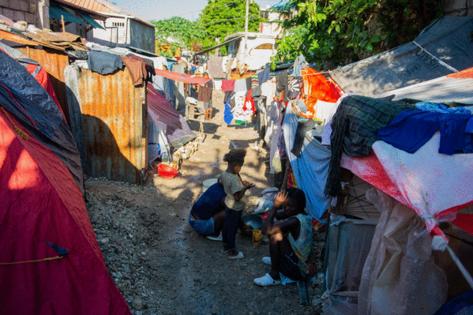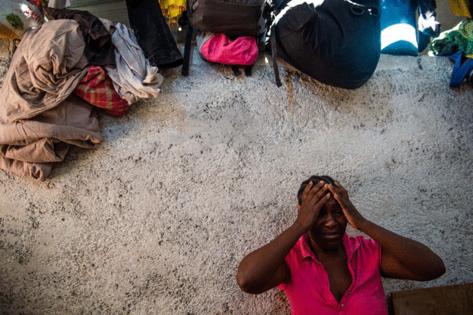After gang violence shuts Haiti's major airports, US continues deportation flights into another city of 'catastrophe'
Published in News & Features
Haiti’s second-largest city, Cap-Haïtien, has the only airport in the country open to international commercial air travel. But getting in and out of the northern city has for weeks now been nearly impossible.
Domestic flights remain grounded after gang gunfire last month struck three U.S. commercial airplanes, prompting a ban against U.S. flights to Haiti and the temporary closures of Port-au-Prince’s airports. The sea is not an option and the two major national roads leading to the capital are not only impractical because of armed gangs but they’ve now been made impassable due to damage and recent landslides triggered by heavy rains.
Still, despite the blocked and deadly road conditions and escalating gang violence that has forced 50,000 Haitians to flee their homes in the last two weeks and aid workers to leave Haiti, the U.S. Immigration and Customs Enforcement on Tuesday chartered a flight to return 70 Haitians there.
The first deportation flight since last month’s gang attacks grounded U.S. flights landed in Cap-Haïtien came despite warnings from human rights groups and the United Nations about returning people to a country gripped in chaos. It also comes less than two months before President-elect Donald Trump, who has promised to massive deportations once he takes office in January. In the interim,the Biden administration continues to tout its efforts to deport migrants and reduce unlawful border crossings — including a 60% decrease in encounters between ports of entry along the Southwest border.
The U.S. decision to deposit deportees at the small international airport in Cap-Haïtien, whose construction the U.S. once opposed because the funding was a loan from Venezuela, has advocates and city residents reeling. Most migrants returned by air are not from the region, requiring them to cross gang-controlled roads or to stay put.
“Okap is still 26.66 square miles,” Mayor Yvrose Pierre said referring to the city by its nickname. “It has not gotten any bigger.”
The city, she notes, has already been the recipient of a growing migration wave. In addition to deportees from the U.S., the Dominican Republic is also dumping thousands of Haitians across the border in northeast Haiti. Meanwhile, Haitians and international aide workers fleeing the gang violence in Port-au-Prince are also running there for refuge.
The growing internal migration, Pierre said, is straining a city that was not prepared “to receive the volume of people who are coming.”
Marc Georges, a former chamber of commerce president and resident, said the city cannot afford to receive deportees.
“I don’t think we can afford any more trouble, any more problems today, tomorrow or the next day,” he said. “The U.S. has to understand Haiti cannot afford any more problems.”
To make his point, Georges shared a video of the city’s streets on Tuesday: Roads were flooded with water and garbage, and many areas remained inaccessible after overnight heavy rains.
Pierre didn’t learn about the deportation flight until a Miami Herald reporter informed her. The reason, she said, is because she and other officials had spent the morning digging people from underneath the rubble after mudslides buried homes in some parts of the city. At least one person died, Pierre said.
“It’s a catastrophe,” she said. “Throughout the center of town, there is mud, rocks, trash.”
With many deportees unable to get home because of the insecurity blocking their routes, Pierre said people “are sleeping in the public markets, in the public squares” and coming to her office seeking help when “the mayor’s office doesn’t even have the ability to respond to the urgent needs of the population.”
“As far as I’m concerned the central government needs to declare a state of emergency for Okap because it cannot just be for Port-au-Prince,” she said, lamenting the lack of financial assistance from Haiti’s central government in Port-au-Prince to help help her even get equipment to clean the streets.
U.S. Department of Homeland Security officials on Tuesday defended the deportation flight, repeating the same comments that they’ve consistently provided when asked about deportations to Haiti, a country where new levels of chaos after the dismissal of the prime minister last month ushered in fresh waves of gang attacks.
The ongoing crises, which include gang attacks, record levels of hunger and deepening political instability, have all led to the U.N. and human rights groups warning that deportations undermine efforts to address the multi-faceted crisis.
“DHS is monitoring the situation in Haiti and coordinating closely with the State Department and international partners,” the agency said in a statement provided to the Herald. “DHS will continue to enforce U.S. laws and policy throughout the Florida Straits and the Caribbean region, as well as at the Southwest border. U.S. policy is to return non-citizens who do not establish a legal basis to remain in the United States.”
Concerns throughout Haiti
By all accounts, Haiti stands at a dire crossroad. The worsening humanitarian crisis and surge in gang violence are pushing Haitians into an even more extreme state of vulnerability as people leave their homes, and children now account for more than half of the more than 700,000 who are internally displaced, according to the United Nations.
Sexual violence, used as a weapon of terror, is reaching alarming levels while more than 4,500 have died in gang-related violence, so far this year, according to the U.N. Human Rights Office. Schools are closed, the health system is on the brink of collapse and poverty and hunger are spreading as thousands are forced into makeshift camps with no access to potable water, latrines or even tarps.
“The isolation of Port-au-Prince is amplifying an already dire humanitarian situation,” Grégoire Goodstein, the head of the U.N. International Office for Migration in Haiti, said recently. “Our ability to deliver aid is stretched to its limits. Without immediate international support, the suffering will worsen exponentially. With only 20 percent of Port-au-Prince accessible, humanitarian workers face immense challenges in reaching affected populations.”
But as the focus concentrates on Port-au-Prince, where an armed international force led by Kenya continues to be outgunned by gangs, fears are growing elsewhere in the country that it’s just a matter of time before the crisis ends up at their doorsteps. Pierre, the mayor, takes credit for the lack of a gang problem in Cap-Haïtien saying “it’s because in 2020 I assumed my responsibility as mayor and destroyed a gang fiefdom.”
“But if everyone is coming to Okap today, including the international organizations that have relocated here ... today they have to provide support to hold and secure the city.
“At times the police don’t even have gas to patrol the streets,” she said. “They need vehicles, they need guns, they need ammunition, they need the means to provide service ... it’s a total mess for Cap-Haïtien.”
Guerline Jozef, head of the Haitian Bridge Alliance, an immigration advocacy group based in San Diego, said “deportations to Haiti right now is a crime against humanity.”
On Tuesday, she was trying to tack down the whereabouts of Naika Cajuste, a young woman who was arrested after crossing the border in Texas. The woman said she had not been given a credible fear interview and had a call scheduled with her lawyers for Tuesday but advocates could not find her in the system.
Tuesday’s flight is Biden’s 298th to Haiti, said Tom Cartwright, an independent volunteer analyst who tracks ICE deportation flights. He estimates that so far 27,800 Haitian deportees have been returned from the U.S.
Removals from Dominican Republic
The total is almost the same number that the Dominican Republic returned back to Haiti just in October when President Luis Abinader’s government announced it would expel up to 10,000 Haitian immigrants a week.
IOM, which has been trying to respond both to the deportation crisis and the Haitians being internally displaced by gangs, has documented 48,943 Haitians returned by the Dominican Republic in just two months. Of those, however, the agency has only been able to help 6,674 people, underscoring the lack of funding available as U.N. agencies face a funding shortfall in Haiti.
So far this year, 182,429 Haitians have been deported with 176,976 from the Dominican Republic. For the same period, the U.S. deported 1,450 people, according to IOM’s data.
A recent U.N. report on the returns of Haitians from the Dominican Republic, found that most returnees are arriving at the border in a very precarious and vulnerable state, with limited or no resources or documentation, and in need of medical and or psychological care.
William O’Neill, the U.N.’s independent human rights expert for Haiti, said deportations to Haiti must stop.
“Haitians are suffering from relentless violence and systematic human rights violations which do not allow for the safe and dignified return of migrants or refugees,” said O’Neill. “The facilities in Cap-Haïtien are nowhere near what is required to accommodate people forcibly returned. Severe shortages of lodging, food, clean water and access to medical care risk further destabilizing an extremely fragile situation in the north while the country’s main airport in Port-au-Prince remains closed due to the dangers posed by nearby gangs. Now is not the time to exacerbate further Haiti’s human rights and humanitarian catastrophe.”
________
©2024 Miami Herald. Visit miamiherald.com. Distributed by Tribune Content Agency, LLC.










Comments